Contractor Comment: Tough decisions help grow Cornish farm
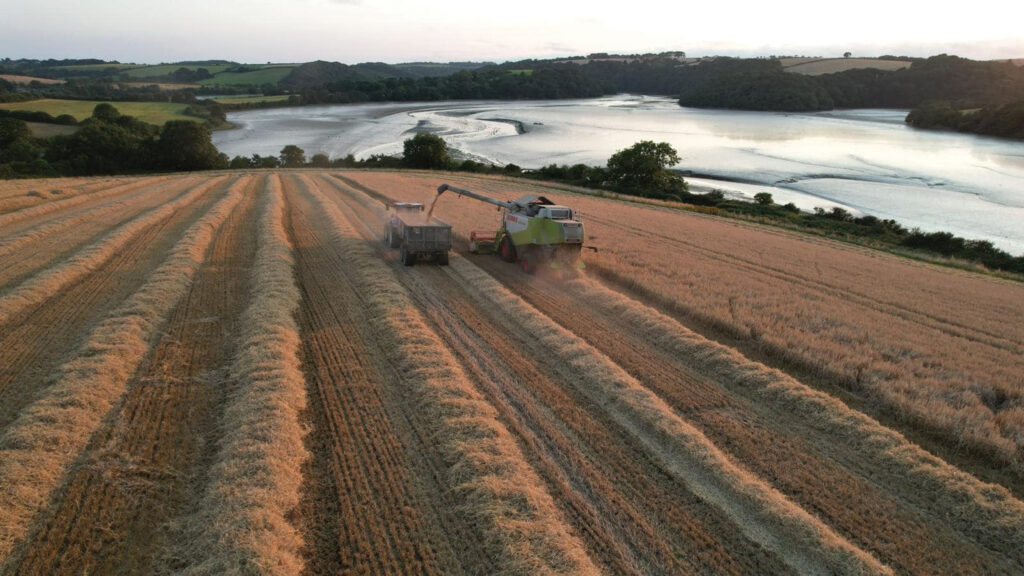 © James Andrews
© James Andrews On our Contractor Comment roster this week are Cornwall-based Josh and Helen Collins, whose extensive machinery fleet is almost exclusively built by Claas.
Farmers Weekly catches up with them.
See also: Contractor Comment: Challenges of contracting on a small island
How did you get into contracting?
We originally farmed with family and had a contracting business on the side. But when the tenancy came up for grabs on this farm, we saw an opportunity to expand and set up on our own.
The tender was put in, somehow we won it, and we’ve been here for seven years. There’s only 40ha of ground, so the farming is secondary to the contracting business, but it’s a fantastic base.
Farm facts: JJ and HE Collins Agricultural Contractors, Tresillian, Cornwall
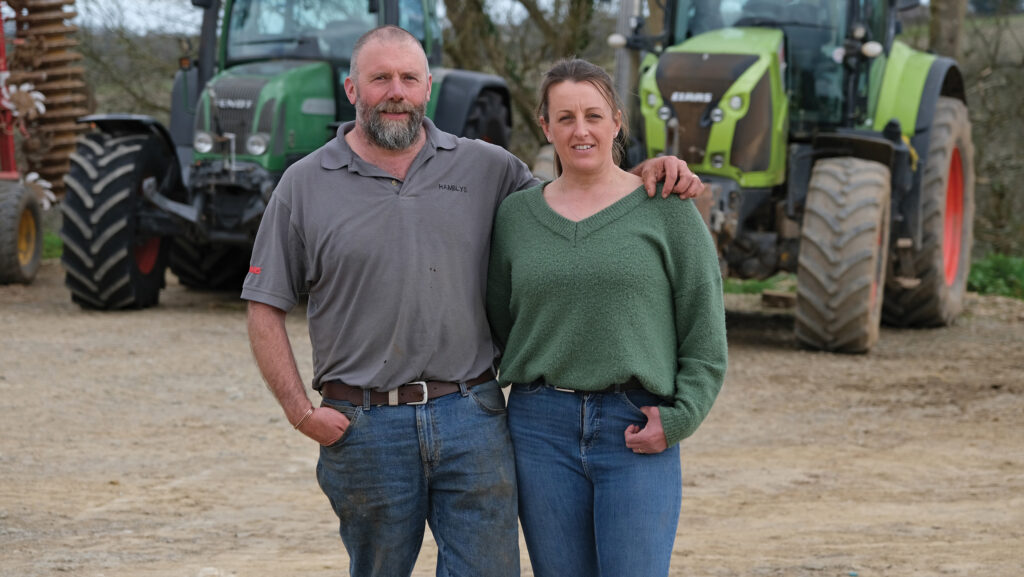
Josh and Helen Collins © James Andrews
- Main services: Grass, maize and wholecrop silage (3,000ha), ploughing and cultivation work (4,000ha), drilling (160ha), combining (400ha), round/square baling (20,000 bales), umbilical and tanker slurry spreading, muckspreading, hedgecutting
- Other: Groundworks business running excavators and dumpers, portable slurry bag hire
- Staff: Josh, Helen, and son Henry, plus seven full time, one part time, and extra seasonal help
When we first got here, we had two tractors, a combine, a round baler and a few implements – and the plan was to steadily build up from there.
A well-used Claas 870 forager was the first major purchase, which got us into silage. We were buying other bits and pieces as and when we could.
Then we got a call that changed things dramatically.
A larger local silage contractor, Key Contracting, was packing up and offered us the opportunity to buy the kit and take on its customers.
It was too good an opportunity to turn down, but it seemed there was no way we could afford it.
Eventually, we worked out that we could just about do it, providing we sold our combine and forager and got a big loan from the bank.
Once the deal was done, we had a four-year-old Claas Jaguar 950 to our name, three silage trailers, a four-rotor rake, a slurry tanker, three staff and the goodwill of the customers.
In order for us to continue combining, we switched to hiring two smaller machines from JMT Combine Hire, which has continued to this day.
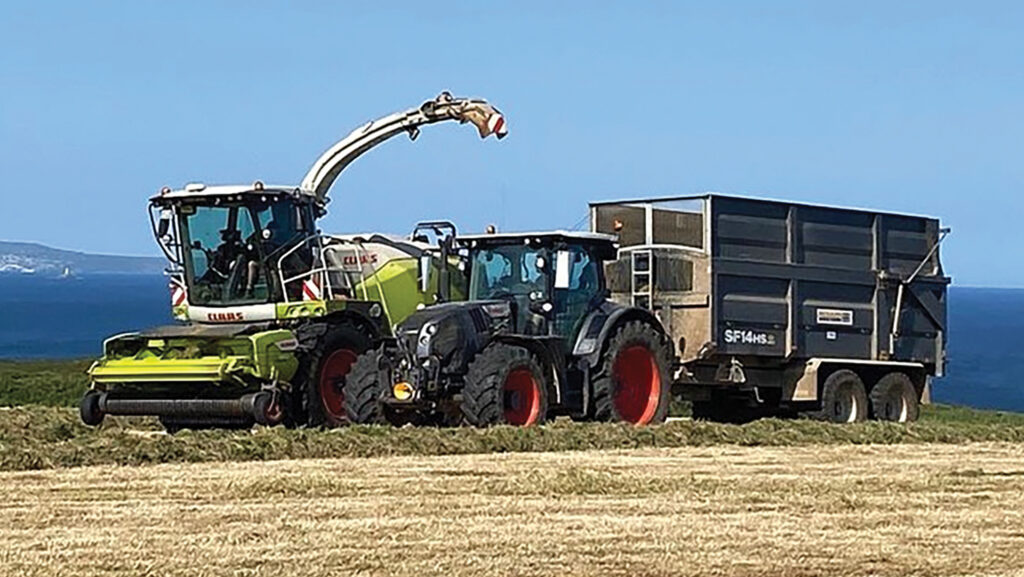
The Jaguar 950 chops 3,000ha of grass, maize and wholecrop © James Andrews
Kit list
- Tractors Claas Axion 830 x4, Arion 660 x2, 650, 630, 570 and 550 x2, Fendt 716
- Forager Claas Jaguar 950 with PU300 grass header, Orbis 900 12-row maize header, DD510 wholecrop header
- Grass kit Claas Disco 8500 mower conditioner, Claas Liner four-rotor rake, Kuhn Merge Maxx 1090
- Loading shovel Claas Torion 1511
- Balers Claas 5300 and 3200 big square, Rollant Uniwrap 455 round baler/wrapper, Marquant 65 small square baler
- Cultivation kit Kuhn six-furrow plough, Kverneland five-furrow plough, 3m Sumo Trio, 5m Vaderstad XL
- Drills 3m Kverneland disc combi drill, home-made 5m folding combi drill with Suffolk coulters
- Muck and slurry equipment 2,500gal Joskin slurry tanker, 2,600gal Hi-Spec slurry tanker, Tramspread umbilical dribble bar, Doda HD35 slurry pump, home-made nurse tank, Richard Western 4095 rear-discharge muckspreaders x2, Richard Western SDS30 side-discharge muckspreaders x2
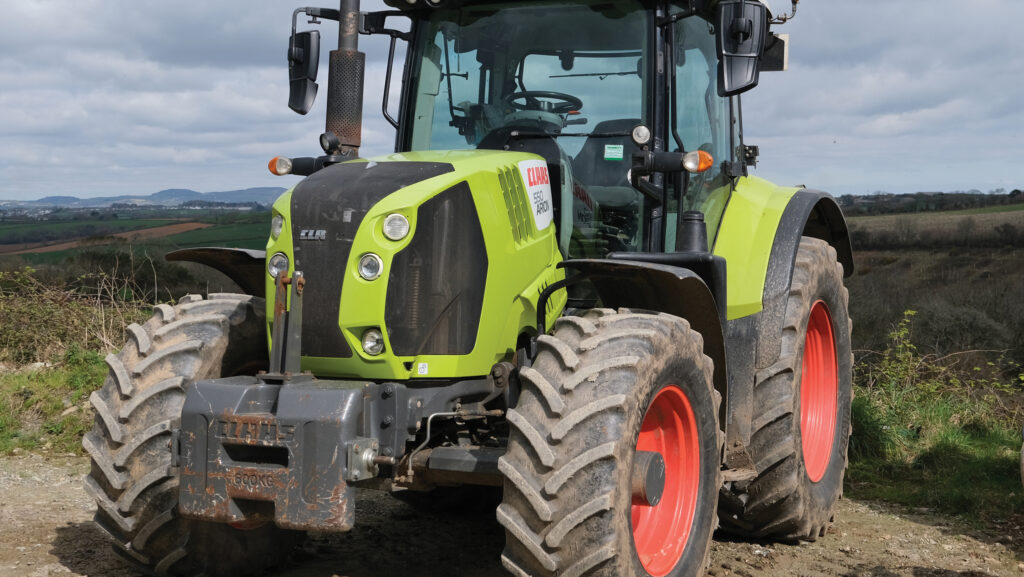
Arion 550 © James Andrews
Main enterprises?
We cover almost all areas of agricultural contracting these days, apart from spraying. We work with another local contractor to provide this service.
Because we’re in a predominantly grassland area, silage, baling, and muck and slurry spreading are some of our main enterprises, but we also do a lot of ploughing and cultivation work, cereal/maize drilling and about 400ha of combining.
On top of this, there’s bed tilling and destoning work, as well as covering early potatoes with plastic. We have our own bed tillers, but the other spud kit is provided by the customer.
When we’re stretched during peak season we team up with DJ Keat & Sons at Bodmin.
Its base is just far enough away that we don’t have an overlap of customers, but close enough to warrant driving tractors between our patches.
Our busy periods always seem to differ slightly, so the arrangement works well for both parties.
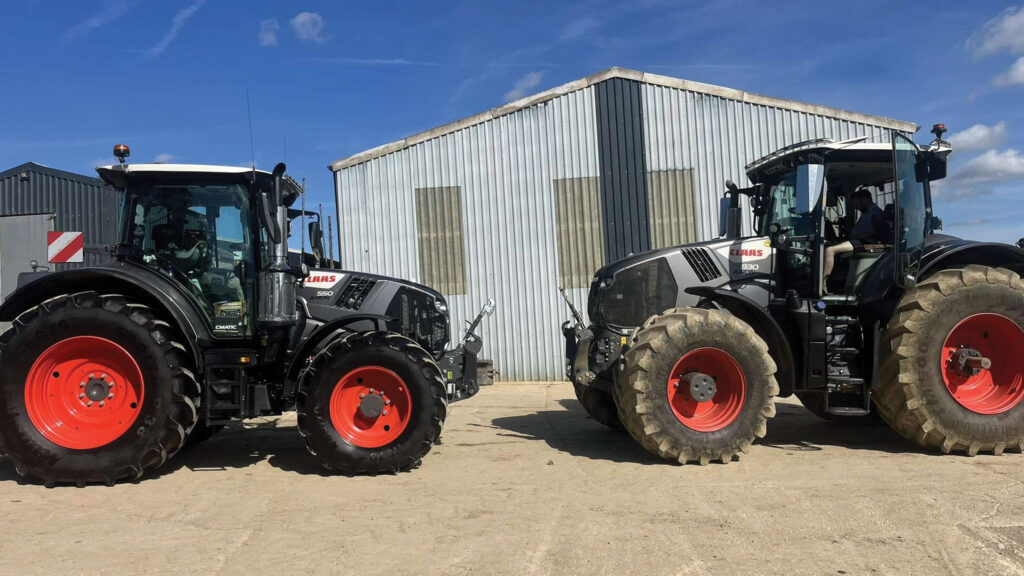
Claas Arion 550 and Claas Axion 830830 © James Andrews
Any diversifications?
Portable slurry bag hire was our first diversification after we were approached by Bennamann to help organise temporary storage.
It had been caught out by cheap, thin bags that couldn’t be emptied properly, so we did our research and ended up purchasing six 350cu m Albers Alligator Winbags from Tramspread.
These are so tough you can drive on them and they have plenty of ports for filling, emptying and circulating the contents.
They’re easy to transport too, as they can be wound onto a bobbin and loaded onto a trailer. Most customers are fairly local, but we have taken them as far as Wiltshire.
More recently we’ve branched out into groundworks with a new venture called Agri Dig.
This is separate to the ag contracting business and is run in partnership with a friend.
So far, we’ve got two second-hand 13t Case diggers – a CX30D and CX30E – and a pair of Wacker Neusen dumpers.
The idea was that it would keep us busy in the winter and not clash too much with the ag work. However, the first big job has already overrun so we could have to do some juggling.
Salt spreading is another sideline to bring in some cash over winter, although it’s not that frequent with the mild climate we have down here.
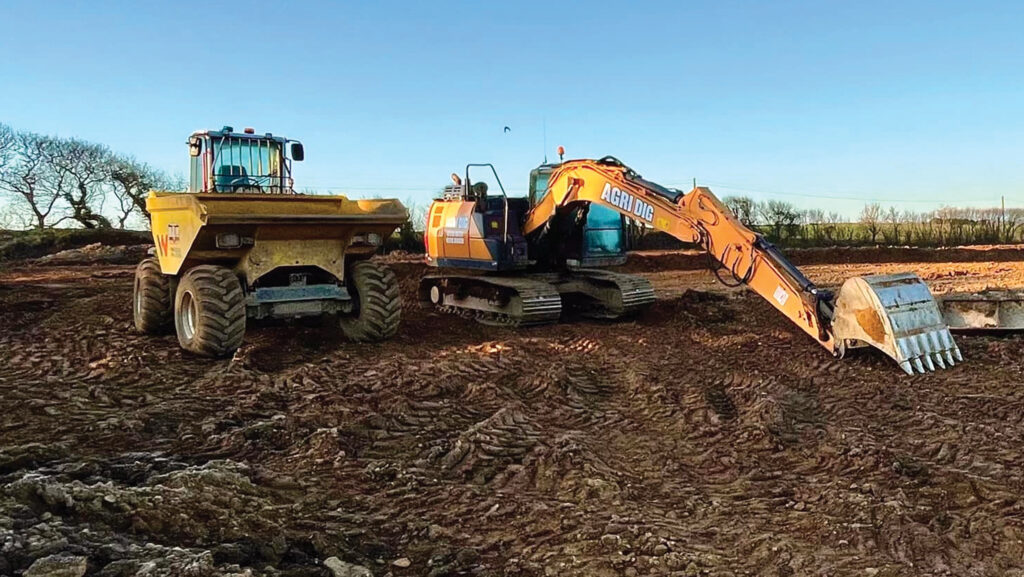
The Collins also run a groundworks venture called Agri Dig © James Andrews
Most and least profitable services?
The diggers and dumpers are definitely more profitable than any of the agricultural work, but these are just a sideline for us.
When it comes to the farm work, we don’t get too hung up on which jobs make the most money.
We need them all to offer a complete service to our customers, so the important thing is that there’s a decent profit overall.
The wholecrop header is one of the loss leaders, as it’s expensive to buy and doesn’t really get enough work to warrant the outlay.
It’s a similar story with umbilical slurry spreading. You need a lot of kit and we’re not doing it in a big enough way for it to be particularly profitable, yet it’s a job we feel we need to offer.
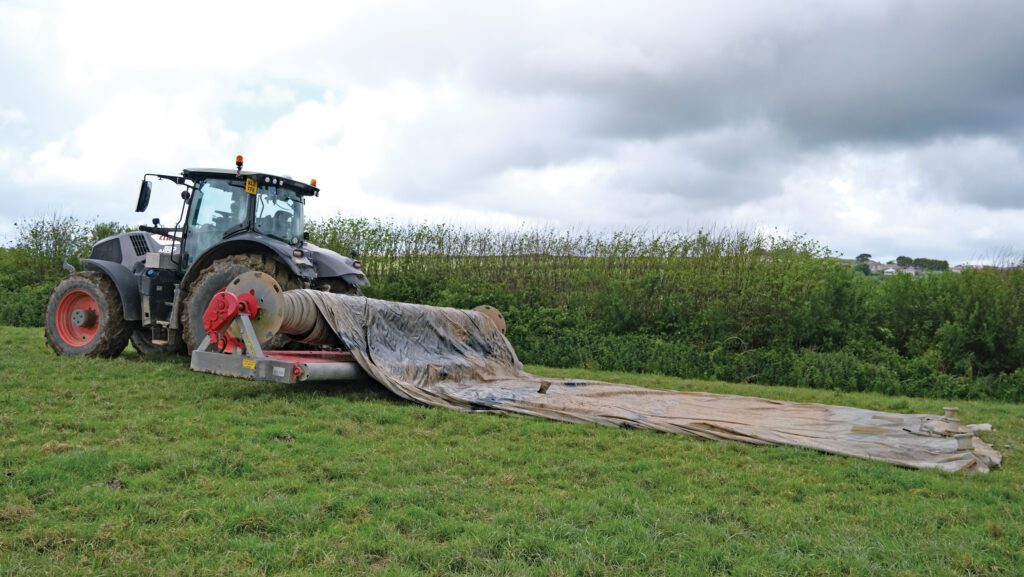
Portable slurry bag hire is one of several sidelines © James Andrews
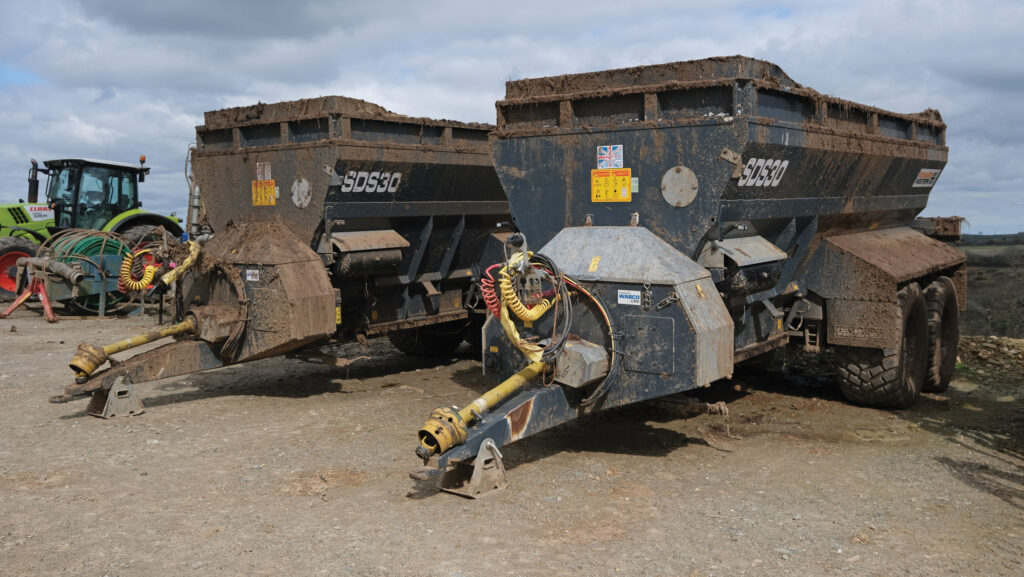
Two of the four Richard Western muckspreaders primed for action © James Andrews
Biggest threats?
Cashflow and bad debts are the toughest thing for us which, because of declining farm incomes, is only getting worse.
Some customers owe us a lot of money and we work with them to manage that – it’s not their fault, the money often just isn’t there.
In a few cases we’ve moved to a monthly direct debit based on their average annual charge, a bit like electricity bills.
We then settle any small differences at the end of the year. This does seem to help and avoids them having to find a huge sum all at once.
Equipment prices are another strain as they’re so high relative to what you can charge for the work they do.
In contrast, the fees for hiring out construction kit are more lucrative relative to their purchase price.
Difficulties will staff recruitment?
We’re always reading how contractors struggle to get decent staff and it does make us worry.
But it’s never been a problem for us. We’ve got a great team at the moment, many of which have been with us for years – one since the start – and we usually get plenty of good applicants if we advertise a position.
What excites you about the season ahead?
We’ve always got work on, but there’s nothing like the buzz when we’re in peak season, everyone is flat out and the phone’s ringing off the hook.
There might be some cursing at the time, but we secretly love it. It’s also amazing how much work we can get through when the pressure is on.
Recent new machines?
One of the latest arrivals is a well-used Fendt 716 that’s got 19,500 hours on the clock. A dealer was selling it for £17,500, but by trading in a Massey Ferguson 390 and 4355 we got £500 cashback.
It won’t be a frontline tractor, but will be handy for running a hedgetrimmer and pulling trailers.
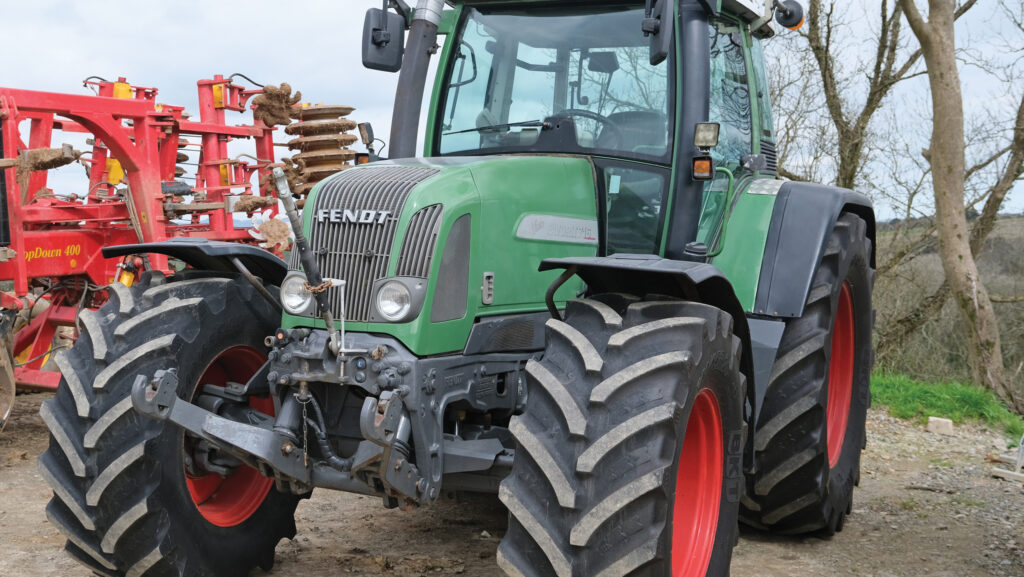
This 19,500-hour Fendt 716 is a recent arrival © James Andrews
We’ve also got a couple of new Claas tractors due to be delivered soon, one of which will be an Axion 830 with a Cmatic CVT transmission.
This will join three identical models and, like them, will come with gunmetal grey livery.
The first tractor we had in this colour scheme was a special edition, which happened to be available at the time.
But we thought it looked smart and liked the fact that it made us stand out.
It’s very expensive to have this done at the factory these days, so our dealer, Hamblys, gets it done locally instead.
The other imminent arrival is one of the new high-horsepower, four-cylinder Arion 570s. With 180hp in a compact chassis it should be a gutsy all-rounder.
Another thing we’ve been mulling over is some cheap horsepower for bed-tilling.
Both a Challenger and early Xerion 3800 have been discussed, but the latter is probably the front runner as wheels would be far better on the road than tracks.
You can find 15-year-old ones for about £40,000, which isn’t bad for 380hp.
Major breakdowns and repairs?
Of all the machines we’ve had, none have been as troublesome as the Kuhn Merge Maxx.
This has been compounded by the dealer’s inability to provide service or communication. However, when they do turn up to repair it their engineer has been excellent.
When it’s working well it does a fantastic job and you get more out of the forager, but those occasions are few and far between.
The only saving grace has been Kuhn’s willingness to try and rectify the faults.
For the bulk of the work, we’re now moving to a Claas Liner four-rotor rake which will hopefully take the pressure off the merger and allow it to be used purely for customers that request it.
Our Claas Torion 1511 four-cylinder loading shovel has also given a few problems of late.
While it was away being fixed we were lent its successor, the six-cylinder 1511P, which is smoother and far gutsier. Another one for the wish list…
The thing we like about the 1511 is that it has the lifting abilities of the JCB 435s in a more compact chassis, which is invaluable when we’re working on smaller clamps.
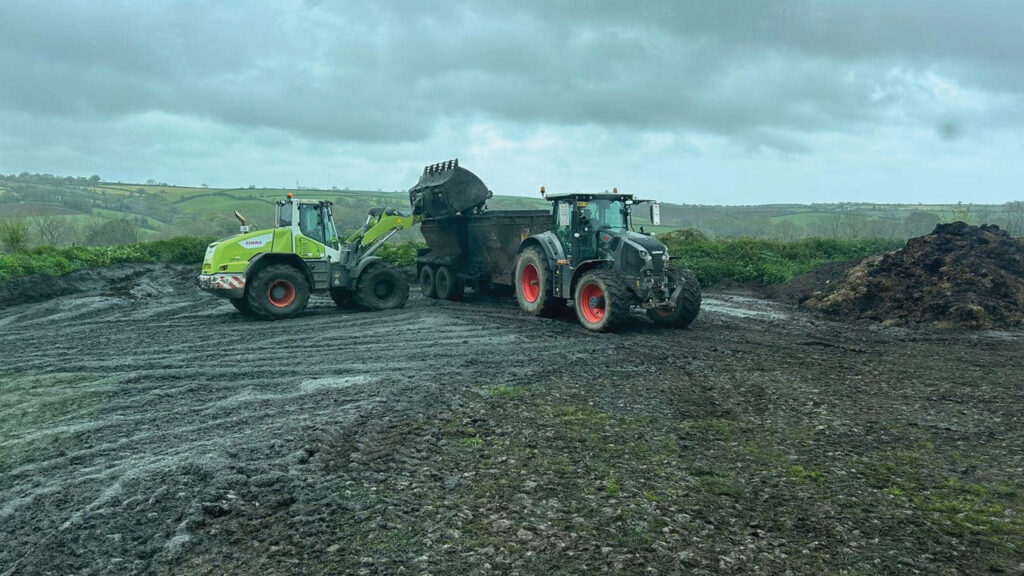
Claas Torion 1511 does all the heavy lifting © James Andrews
Recent workshop projects?
We made a simple aerial road crossing for umbilical slurry pumping (off-highway use only) out of an old tubular chassis off a Grimme potato harvester.
By cutting out the two front sections of tube and welding them together, we created a strong 10m-long pipe with 90deg bends at either end for attaching the flexible hoses to.
Remarkably, this was just the right diameter for the fittings to slide into, which we were then able to weld in place.
Loading shovel brackets were attached on one end so that it could be hoisted over the roadway and we fitted pallet tine brackets at the other side for added support.
It cost us virtually nothing and has worked really well.
Another recent project was converting an old RMH twin-tub mixer wagon into a slurry nurse tank.
This was achieved by pulling out the internals, welding up most of the openings and fitting two outlets into the recesses where the driveshafts once sat.
An up-and-over pipe was added for filling and we fitted cross braces to help support the sides. Total capacity is only 30cu m, but it’s a useful buffer when we’re hauling slurry over long distances.
Current contractor frustrations?
All the usual stuff really – money, weather and the odd tricky customer. But social media is one of the most awkward things to manage these days.
On the one hand, it’s great for advertising our services and showing customers what we’re up to, but it can also be a toxic place where people will criticise anything and everything.
We now think very carefully before posting and ask our drivers to do the same.

